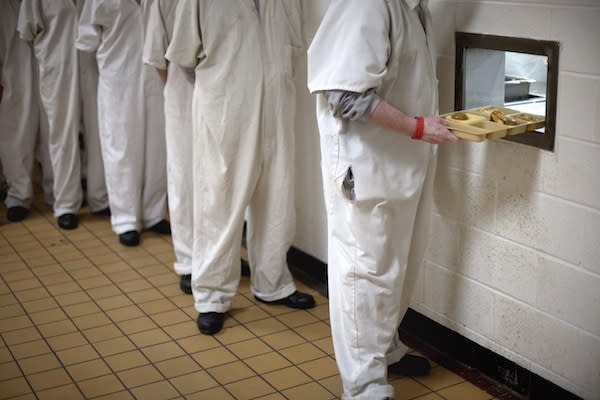 The Lookout
The LookoutConservatives, NAACP say states send too many people to jail

The NAACP unveiled a new report [PDF] urging states to lock away fewer prisoners for drug offenses, and to redirect some of the massive amount of money that goes to jails to schools. The report picked up endorsements from a few politically strange bedfellows: former GOP Speaker of the House Newt Gingrich and Grover Norquist, the conservative activist who founded Americans for Tax Reform.
"You have Tea Party activists and NAACP activists pushing the same bills," the civil rights group's president Ben Jealous said during a PBS NewsHour report, referencing the prison reform movement in Texas.
This alliance is perhaps even more surprising given that only last July, the NAACP was accusing the tea party of racism, prompting one tea party leader to write an offensive letter to Jealous in the voice of Abraham Lincoln. Apparently the animosity has been buried as conservatives target the growing prison system (thanks to years of "tough on crime" policies) as part of their crusade against big government.
The report says more than a quarter of the 2.3 million American prisoners are jailed for drug offenses, and points out that America has just 5 percent of the world's population but 25 percent of its prison population. State prisons eat up $50 billion a year, and growth in prison spending has outpaced higher education spending by 600 percent over the past 20 years. Even as state education spending dried up in the past two years due to the recession, 33 states managed to up their contributions to their prisons, the report says.
How to fix that? The NAACP recommends shorter sentences for young offenders, allowing prisoners to leave jail early if they engage in rehab or vocational programs, and eliminating mandatory minimum jail sentences for drug offenses.
Eliminating mandatory minimums in particular has picked up a following among conservatives lately. In December, conservative Christian talk show host Pat Robertson endorsed faith-based drug rehabilitation programs instead of jail time for drug use on his show "The 700 Club," and even appeared to advocate for legalizing marijuana. "I'm not exactly for the use of drugs, don't get me wrong," he said. "I just believe that criminalizing marijuana, criminalizing the possession of a few ounces of pot--that kind of thing--it's costing us a fortune and it's ruining young people."
Robertson also promoted the work of the Texas-based conservative group "Right on Crime," which has spurred the introduction of over a dozen prison system reform bills this year in the state's legislature. In 2005, Texas began reforming drug sentencing and shifting money to drug rehabilitation and prevention programs, which has saved the state billions and reduced crime, according to The Washington Post. Lawmakers in Georgia and Florida are debating following suit.
But not everyone is happy with the NAACP's recommendations.
"To suggest that there should be no consequences or reduced consequences for hurting other people or taking their property is nonsensical," James Pasco, executive director of the Legislative Advocacy Center of the Fraternal Order of Police, told The Christian Science Monitor. He also said the report misses that many people who are in jail for minor crimes pleaded down from more serious ones, thus painting the nation's prison population as more benign than it actually is.
And Norquist, who appeared alongside Jealous on PBS to endorse the report, was careful not to comment on the civil rights group's conclusion that more federal and state education spending could prevent America's young people from becoming prisoners.
The NAACP is also spotlighting stories of people who became entangled in the prison system and have since reformed, like Marlo Hargrove, who began selling drugs at age 10. Hargrove begged to be let into a drug rehabilitation program rather than serve two years in jail, and then co-founded a support group for ex-prisoners called F.A.C.E. (Freedom Advocates Celebrating Ex-Offenders).
(Prisoners in a Georgia state prison are handed lunch through a hole: AP)
